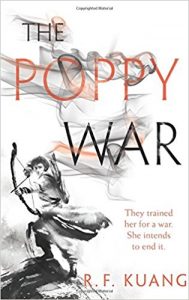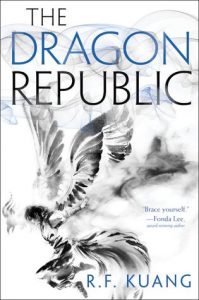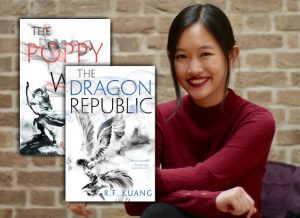Author Spotlight – R. F. Kuang
Rebecca F. Kuang is the Nebula, Locus, Campbell, and World Fantasy Award nominated author of The Poppy War and its forthcoming sequel The Dragon Republic (Harper Voyager). She is currently pursuing an MPhil in Modern Chinese Studies at Cambridge University on a Marshall Scholarship, where her dissertation examines propaganda literature by Northeast writers during the Second Sino-Japanese War. Her debut The Poppy War was listed by Time, Amazon, Goodreads, and the Guardian as one of the best books of 2018 and has won the Crawford Award and Compton Crook Award for Best First Novel.
Welcome to the Hive, Rebecca. Let’s start small: tell us about a great book you’ve read recently!
I just finished Marisha Pessl’s Special Topics in Calamity Physics, which I highly recommend! I really love “dark academia” books like The Likeness and The Secret History (probably because I’m looking at nearly another decade of student life!), so this was right up my alley.
Okay, time to escalate things: reality warps and you suddenly find yourself leading a D&D-style party through a monster-infested dungeon. What character class are you, and what’s your weapon of choice?
Ooh, this is a fun question because I JUST designed my very first D&D character with some friends on a train ride to Scotland. I still don’t know much about D&D so some of these details may be wrong, but the character is a hulking swordsman named Randal “Jack Six Fingers” Glenkinchie who wields a magical greatsword named Glen Moray passed down by his ancestors. (Clearly, we decided all this right after a whiskey tasting.) He’s not the brightest, but he’ll do anything to defend his friends, and he has a big heart.
A lovable brute! When you’re not trawling through dungeons, how do you like to work? (In silence, with music, or serenaded by the damned souls of a thousand dead shrimps? Do you prefer to type or to hand-write? Are you an architect or a gardener? A plotter or a pantser? D’you write in your underwear, or in a deep-sea diver’s suit?) Tell us a little bit about your writing method!
I like to draft to music because it gets me in the mood, but when I’m doing revisions I need either silence or the white noise of a coffee shop. I suppose it comes down to two modes of thinking–my free, creative, broad strokes mode, and my more focused, analytical, craft mode. I prefer to type because I tend to make a LOT of changes to my material (I’m not a clean drafter–I write many bad versions before I hit the right version), and because I don’t write chronologically across chapters or even scenes, which requires a lot of copy and pasting and moving stuff around. I have recently realized, however, that if I’m getting stuck on a scene, writing it out by hand can really jumpstart my brain. I write from a loose thematic structure, but am definitely a pantser–I think the term is discovery writers? Basically, I just start composing movie scenes in my head, then figure out retroactively how I can make all the cool stuff link up into something coherent. I cannot write from a scene by scene outline; for me, it takes the spontaneity and joy out of the process. I’m looking back at this paragraph and I realize that my writing style sounds incredibly messy and chaotic. Alas, I can’t make it work any other way.

What (or who) are your most significant fantasy influences? Are there any creators whom you dream of working with someday?
I have so many, so here’s a non-comprehensive list off the top of my head: N.K. Jemisin, Orson Scott Card, Ken Liu, Liu Cixin, Peter V. Brett, V.E. Schwab, Scott Lynch, Madeline Miller…the list goes on and on. You’ll notice all of those authors write extremely different stuff. I try to read as widely and diversely as I can, and to learn from as many authors as possible by figuring out what I like about their prose and working little bits of it into my own style. So my list of influences is constantly expanding, which I think is healthy. I think resting on your laurels is the worst thing that can happen to a writer–it’s important to keep pushing and challenging ones’ own abilities!
I don’t know if I’d ever want to co-write a project with anyone else. I’m very type-A and I need complete creative control, so I think I might be a nightmare to work with on a book project. But I would love to work with other creators on different media, particularly animation.
What was the last thing you watched on TV and why did you choose to watch it? Alternatively, what games have you enjoyed recently?
So I recently watched How To Train Your Dragon: The Hidden World and bawled my eyes out, so I’ve been watching the How To Train Your Dragon animated series on Netflix to give myself my dragon fix. It’s definitely made for kids but I’m really enjoying it. I saw the first movie when I was the same age as Hiccup in the first movie, so I feel like I grew up with him as the trilogy went on, and it’s really hard to say goodbye to that franchise.
I wish I still had time to play video games. I got really into the Bioware games three summers ago–I played both Dragon Age and Mass Effect and really enjoyed them. One of these days when I have more time and money, I’m going to buy myself a gaming PC (I run my life on a Mac!) and finally play Inquisition.
Speaking of time… The world shifts, and you find yourself with an extra day on your hands during which you’re not allowed to write. How do you choose to spend the day?
I really enjoy hiking. I like being far away from people and cities and just looking out over endless expanses of green and blue. I just got back from a hiking trip to Edinburgh and my soul isn’t happy about readjusting to normal life, so I’d like to go back to Scotland and hike some more. I’m absolutely going to the Isle of Skye sometime over the next year.
Can you tell us a little something about your current work(s) in progress?
Right now I’m working on Book 3 in the Poppy Wars trilogy. I’m getting really, really closed to a finished draft that I’m proud of! I’m also doing research and worldbuilding work for my next project after this trilogy. I’m not going to say much about it other than that its working title is Class 45 and it’s about an alternate historical fantasy story about a student revolution in the Victorian era.

Sounds exciting! What’s the most (and/or least) helpful piece of writing advice you’ve ever received?
Most helpful: N.K. Jemisin told my Odyssey class to examine why so many fantasy novels are about restoring the status quo–who benefits from the status quo, and why do they want to keep things the way they are?
Least helpful: [X genre/setting/archetype] is overdone and will never sell. It’s almost never true! Every story is recycled from other stories, so what matters is creating your own special version of it.
Every writer encounters stumbling blocks, be it a difficult chapter, challenging subject matter or just starting a new project. How do you motivate yourself on days when you don’t want to write?
I actually have the opposite problem–I stress a lot about not getting my writing in on days when I am truly exhausted. I’ve had to teach myself this year to let go of that anxiety–sometimes you need your days off to rest and recharge. I think my anxiety about taking days off comes from a fear that if I take a break, I won’t be able to summon the willpower to start working again. But I’ve found consistently that the opposite happens–I always return to my desk excited to write.
If you could visit any country at any point in history, where/when would you go, and why?
To be quite honest, if I could guarantee my own safety, I’d love to visit London during WWII. I’m sure I wouldn’t have a good time, but that specific traumatic period has resonated so loudly in popular memory, film, and literature, that I am deeply curious to see what it was actually like.
Tell us about a book that’s excellent, but underappreciated or obscure.
I find this question such a back-handed compliment–no author likes to hear that their work is “obscure”! I will avoid this problem by recommending some authors who are dead. I think more English-speaking readers should check out some of the great works of Chinese modern literature. Early twentieth-century writers like Lu Xun, Mao Dun, Ding Ling, Xiao Hong and Zhang Ailing are so important to understand the development of Chinese literature, and there are wonderful translations of all of them available!
Finally, would you be so kind as to dazzle us with an elevator pitch? Why should readers check out your work?
The Poppy War is basically Avatar: the Last Airbender if Azula was the main character and everyone was on drugs. The Dragon Republic is The Poppy War’s dipshit older brother who won’t hesitate to sock you in the teeth.
Fantastic! Thanks for joining us, Rebecca, and good luck with the release of The Dragon Republic!
R.F. Kuang is the author of THE POPPY WAR and THE DRAGON REPUBLIC, both available now.


